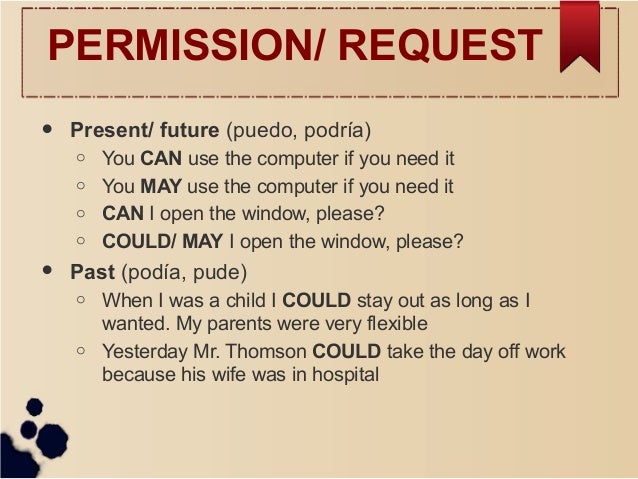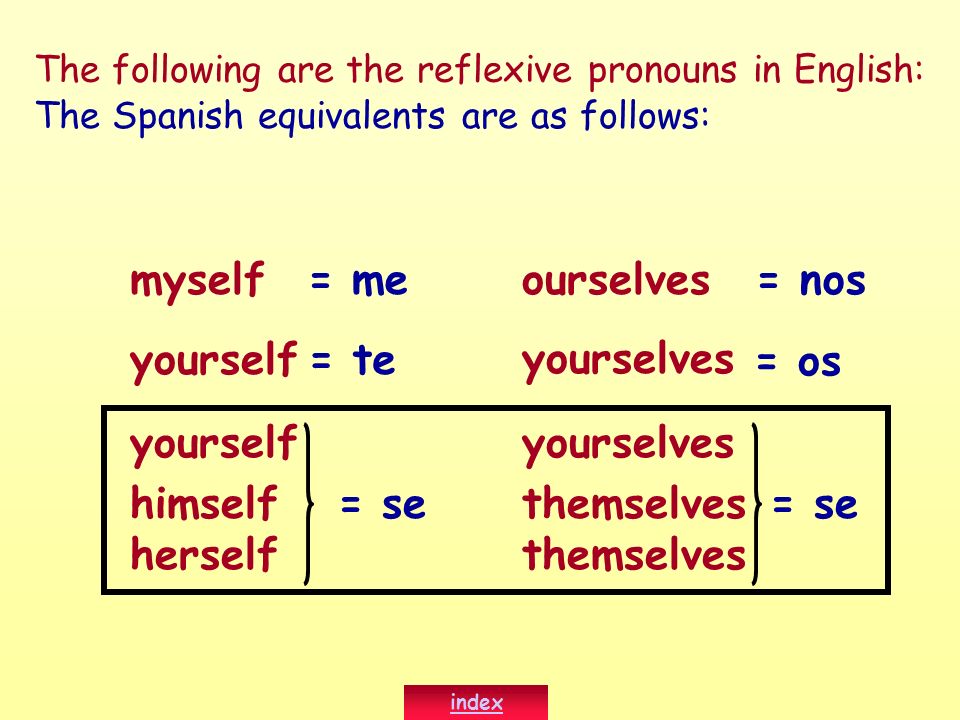
Modals of permission and request (can, could, may and others).
Los verbos modales, como su nombre lo indica, son aquellos que modifican a otro verbo, comunicándole diferentes significados.
Los verbos modales se caracterizan por:
.- Ir siempre acompañados de un verbo principal en su forma de infinitivo sin TO ( a excepción de OUGHT TO).
Los verbos modales se caracterizan por:
.- Ir siempre acompañados de un verbo principal en su forma de infinitivo sin TO ( a excepción de OUGHT TO).
.- Tener sólo 1 o 2 tiempos (presente y pasado).
.- Carecer de "s" en la tercera persona (he, she, it) del singular del presente.
.- Interrogar y negar por sí mismos, sin ayuda de auxiliares.
I.- CAN - COULD:
CAN y sus equivalentes (be able to, be capable to) indican habilidad fisica o capacidad mental. Su equivalente en Castellano corresponde al verbo PODER.
Ejemplos: He CAN walk to the bookshop.
She CAN solve the problem.
CAN puede ser usado para expresar ideas en presente o en futuro, pero nunca en pasado.
Ejemplo: Nancy CAN run next weekend.
La forma negativa del CAN es CANNOT y su contracción negativa es CAN'T.
COULD como forma de pasado de CAN indica también habilidad física o capacidad mental. En este caso se emplea para acción en el pasado, dentro de la misma oración haciendo las veces de adverbio de tiempo.
Ejemplo: He COULD read the thermometer when she was in high school.
COULD también expresa la idea de posibilidad. En este caso su equivalente en Castellano es PODRÍA, con lo cual el tiempo que indica puede ser presente, pasado o futuro.
Ejemplo: He COULD start now.
He COULD write the report if he had a computer.
He COULD come tomorrow.
La forma negativa de COULD es COULD NOT y su contracción negativa es COULDN'T.
COULD:
habilidad en el pasado: "I could play the piano when I was a child"
posibilidad: "There could be trouble if the government tries to force this measure through"
pedidos y sugerencias: "Could you give me a hand?" "We could go to the theatre tonight"
para pedir permiso: "Could I leave a bit early today?"
permiso en el pasado: "When I was young I could invite friends to my house because my mother allowed me to"
deducción: "That could be John's car I can hear -- he said he was coming"
prohibición en el pasado: "When I was young I couldn't go out until I had tidied my room"
voluntad: I couldn't possibly leave Tim here on his own (I didn't want to, that's why I didn't leave him).
II.- MAY - MIGHT:
May indica la posibilidad en el lenguaje de la ciencia, esta posibilidad puede referirse al presente o al futuro.
Ejemplos: It MAY rain today.
It MAY rain tomorrow.
También indica permiso para ejecutar o realizar una acción.
Ejemplo: Helen MAY accept the invitation.
We MAY go to the beach.
MAY NOT es la forma negativa de MAY.
MAY
posibilidad: We may go to France next year
para expresar deseos/esperanzas: May you both be very happy
permiso: You may go when you've finished
ofrecimientos: May I be of any assistance?
concesión: He may be the boss, but he certainly can't treat us like that
prohibición: You may not go until you've finished!
.- Carecer de "s" en la tercera persona (he, she, it) del singular del presente.
.- Interrogar y negar por sí mismos, sin ayuda de auxiliares.
I.- CAN - COULD:
CAN y sus equivalentes (be able to, be capable to) indican habilidad fisica o capacidad mental. Su equivalente en Castellano corresponde al verbo PODER.
Ejemplos: He CAN walk to the bookshop.
She CAN solve the problem.
CAN puede ser usado para expresar ideas en presente o en futuro, pero nunca en pasado.
Ejemplo: Nancy CAN run next weekend.
La forma negativa del CAN es CANNOT y su contracción negativa es CAN'T.
COULD como forma de pasado de CAN indica también habilidad física o capacidad mental. En este caso se emplea para acción en el pasado, dentro de la misma oración haciendo las veces de adverbio de tiempo.
Ejemplo: He COULD read the thermometer when she was in high school.
COULD también expresa la idea de posibilidad. En este caso su equivalente en Castellano es PODRÍA, con lo cual el tiempo que indica puede ser presente, pasado o futuro.
Ejemplo: He COULD start now.
He COULD write the report if he had a computer.
He COULD come tomorrow.
La forma negativa de COULD es COULD NOT y su contracción negativa es COULDN'T.
COULD:
habilidad en el pasado: "I could play the piano when I was a child"
posibilidad: "There could be trouble if the government tries to force this measure through"
pedidos y sugerencias: "Could you give me a hand?" "We could go to the theatre tonight"
para pedir permiso: "Could I leave a bit early today?"
permiso en el pasado: "When I was young I could invite friends to my house because my mother allowed me to"
deducción: "That could be John's car I can hear -- he said he was coming"
prohibición en el pasado: "When I was young I couldn't go out until I had tidied my room"
voluntad: I couldn't possibly leave Tim here on his own (I didn't want to, that's why I didn't leave him).
II.- MAY - MIGHT:
May indica la posibilidad en el lenguaje de la ciencia, esta posibilidad puede referirse al presente o al futuro.
Ejemplos: It MAY rain today.
It MAY rain tomorrow.
También indica permiso para ejecutar o realizar una acción.
Ejemplo: Helen MAY accept the invitation.
We MAY go to the beach.
MAY NOT es la forma negativa de MAY.
MAY
posibilidad: We may go to France next year
para expresar deseos/esperanzas: May you both be very happy
permiso: You may go when you've finished
ofrecimientos: May I be of any assistance?
concesión: He may be the boss, but he certainly can't treat us like that
prohibición: You may not go until you've finished!

